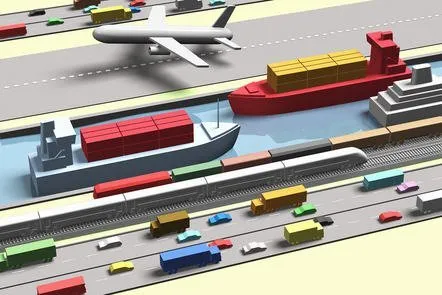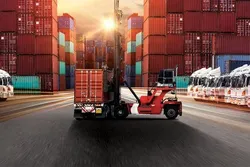
Distribution: product delivery 
The delivery of products is an essential part of any micro or small business. Companies must decide whether to use their own resources or outsource the process. Careful consideration must be taken to ensure the most efficient and cost-effective method of delivery is chosen. ▼
ADVERTISEMENT
Course Feature
![]() Cost:
Cost:
Free
![]() Provider:
Provider:
Edx
![]() Certificate:
Certificate:
Paid Certification
![]() Language:
Language:
English
![]() Start Date:
Start Date:
Self paced
Course Overview
❗The content presented here is sourced directly from Edx platform. For comprehensive course details, including enrollment information, simply click on the 'Go to class' link on our website.
Updated in [March 06th, 2023]
This course provides an overview of the distribution process and product delivery. Participants will learn about the different aspects of logistics, such as selecting routes, choosing vehicles, shipment frequency, and ensuring the reception of changes and returns. Additionally, the course will explore the opportunities of collaboration transport has to offer, which can improve processes and save costs through collaborative work between actors and business partners. By the end of the course, participants will have a better understanding of the distribution process and product delivery.
[Applications]
After this course, participants can apply their knowledge to design the best way to transport goods for their micro or small company. They can consider performing the process by their own means or outsourcing, and learn about the many opportunities of collaboration transport has to offer. This will allow them to improve processes and efficiently save costs through collaborative work between actors and business partners.
[Career Paths]
1. Logistics Manager: Logistics Managers are responsible for overseeing the entire supply chain process, from the initial order to the final delivery. They must ensure that goods are delivered on time and in the most cost-effective manner. They must also be able to identify and resolve any issues that arise during the process. As the demand for efficient supply chain management increases, the need for Logistics Managers is expected to grow.
2. Supply Chain Analyst: Supply Chain Analysts are responsible for analyzing data related to the supply chain process. They must be able to identify trends and patterns in the data and use this information to make recommendations for improving the process. They must also be able to develop strategies for reducing costs and increasing efficiency. As the demand for data-driven decision making increases, the need for Supply Chain Analysts is expected to grow.
3. Delivery Driver: Delivery Drivers are responsible for transporting goods from one location to another. They must be able to safely and efficiently transport goods while adhering to all applicable laws and regulations. As the demand for goods increases, the need for Delivery Drivers is expected to grow.
4. Warehouse Manager: Warehouse Managers are responsible for overseeing the storage and distribution of goods. They must be able to ensure that goods are stored safely and securely, and that they are delivered on time and in the most cost-effective manner. As the demand for efficient storage and distribution increases, the need for Warehouse Managers is expected to grow.
[Education Paths]
1. Logistics and Supply Chain Management Degree: This degree focuses on the management of the flow of goods and services, from the point of origin to the point of consumption. It covers topics such as inventory management, transportation, warehousing, and customer service. Developing trends in this field include the use of technology to improve efficiency, the use of data analytics to optimize supply chain operations, and the use of green logistics to reduce environmental impact.
2. Business Administration Degree: This degree focuses on the management of business operations, including finance, marketing, and human resources. It covers topics such as strategic planning, organizational behavior, and business ethics. Developing trends in this field include the use of technology to improve efficiency, the use of data analytics to optimize operations, and the use of green business practices to reduce environmental impact.
3. Transportation and Logistics Degree: This degree focuses on the management of the transportation of goods and services. It covers topics such as route selection, vehicle selection, shipment frequency, and customer service. Developing trends in this field include the use of technology to improve efficiency, the use of data analytics to optimize operations, and the use of green transportation to reduce environmental impact.
4. International Business Degree: This degree focuses on the management of international business operations, including finance, marketing, and human resources. It covers topics such as global strategy, international trade, and cultural awareness. Developing trends in this field include the use of technology to improve efficiency, the use of data analytics to optimize operations, and the use of green business practices to reduce environmental impact.
Course Provider

Provider Edx's Stats at AZClass
Distribution: product delivery enables learners to understand the importance of product delivery in micro or small companies. They will be able to appreciate the importance of delivery in the production process and how it affects the success of the company. Learners gain an understanding of shipping-related logistical processes such as selecting a route, selecting a vehicle, frequency of shipments, and ensuring receipt of changes and returns. They will be able to understand the different aspects of the process and how these can be used to optimize the delivery process. Learners can learn about the different opportunities that collaborative transportation offers. They will be able to see how collaboration between participants and business partners can improve processes and save costs.
Discussion and Reviews
0.0 (Based on 0 reviews)
Explore Similar Online Courses

Understanding Machine Learning with R

How To Build A Website Using WordPress - AMAZING

Python for Informatics: Exploring Information

Social Network Analysis

Introduction to Systematic Review and Meta-Analysis

The Analytics Edge

DCO042 - Python For Informatics

Causal Diagrams: Draw Your Assumptions Before Your Conclusions

Whole genome sequencing of bacterial genomes - tools and applications

Simulation for Logistics: An Introduction

Sustainability and Green Logistics: An Introduction


Start your review of Distribution: product delivery